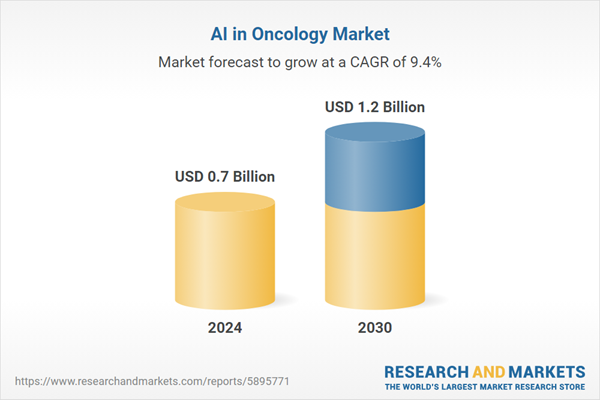Speak directly to the analyst to clarify any post sales queries you may have.
10% Free customizationThis report comes with 10% free customization, enabling you to add data that meets your specific business needs.
Innovations such as machine learning algorithms, deep learning, and integration with imaging technologies like MRI and CT scans are enhancing diagnostic precision. Regulatory approvals, such as the FDA’s clearance of AI-powered cancer detection devices, and platforms like Tempus+ that support precision oncology, are accelerating adoption. Additionally, collaborations between healthcare providers, academic institutions, and AI companies are contributing to technological advancements. AI’s ability to analyze vast datasets and support real-time clinical decisions is positioning it as a vital tool in cancer care, from diagnosis to post-treatment monitoring.
Key Market Drivers
Improving Diagnostic Accuracy
AI’s ability to interpret medical images with high precision is driving its adoption in oncology. By identifying complex patterns in radiological scans such as MRIs and CTs, AI supports early cancer detection and improves diagnostic outcomes. A 2022 NCBI study emphasized how AI significantly enhances the detection of mammographic abnormalities, helping healthcare professionals diagnose cancer at earlier, more treatable stages. Unlike human interpretation, which can vary due to fatigue or experience, AI delivers consistent, objective analysis. This reduces the risk of misdiagnosis and increases confidence among clinicians. Moreover, AI-driven systems support cancer screening programs by efficiently analyzing high volumes of imaging and pathology data, improving throughput and reducing diagnostic delays across healthcare systems.Key Market Challenges
Interoperability and Data Integration
Data fragmentation across healthcare systems is a major barrier to the seamless deployment of AI in oncology. Variations in electronic health record (EHR) platforms, imaging technologies, and data formats hinder the ability to integrate and standardize patient data. For AI systems to function effectively, comprehensive access to medical history, imaging records, and genomic profiles is critical. However, lack of compatibility and uniform standards often leads to inconsistent or incomplete data inputs. This affects the reliability of AI-driven recommendations and creates trust issues among healthcare providers. Data integration challenges also slow the training and validation of AI models, ultimately impacting clinical adoption and scalability.Key Market Trends
AI-Driven Radiomics
AI-powered radiomics is emerging as a key trend, enabling the extraction of detailed imaging features that reflect tumor behavior and biological properties. By analyzing micro-patterns and textures in medical scans, AI systems can detect cancer early, even before clinical symptoms arise. Radiomics not only improves diagnosis but also plays a pivotal role in treatment personalization. AI can link image-based features with molecular and genetic data, guiding precision therapies. Additionally, radiomics tools assist in real-time treatment monitoring by tracking how tumors respond to specific interventions. These systems enhance decision-making and reduce variability in radiological assessments. As AI radiomics becomes more integrated into oncology workflows, it is redefining standards for cancer screening, diagnosis, and outcome prediction.Key Market Players
- Azra AI
- IBM
- Siemens Healthcare GmbH
- Intel Corporation
- GE HealthCare
- NVIDIA Corporation
- Digital Diagnostics Inc.
- ConcertAI
- Median Technologies
- PathAI
Report Scope:
In this report, the Global AI in Oncology Market has been segmented into the following categories, in addition to the industry trends which have also been detailed below:AI in Oncology Market, By Component:
- Software Solutions
- Hardware
- Services
AI in Oncology Market, By Cancer Type:
- Breast Cancer
- Lung Cancer
- Prostate Cancer
- Colorectal Cancer
- Brain Tumor
- Others
AI in Oncology Market, By Treatment Type:
- Chemotherapy
- Radiotherapy
- Immunotherapy
- Others
AI in Oncology Market, By Region:
- North America
- United States
- Canada
- Mexico
- Europe
- France
- United Kingdom
- Italy
- Germany
- Spain
- Asia-Pacific
- China
- India
- Japan
- Australia
- South Korea
- South America
- Brazil
- Argentina
- Colombia
- Middle East & Africa
- South Africa
- Saudi Arabia
- UAE
- Kuwait
- Turkey
- Egypt
Competitive Landscape
Company Profiles: Detailed analysis of the major companies present in the Global AI in Oncology Market.Available Customizations:
With the given market data, the publisher offers customizations according to a company's specific needs. The following customization options are available for the report.Company Information
- Detailed analysis and profiling of additional market players (up to five).
This product will be delivered within 1-3 business days.
Table of Contents
Companies Mentioned
- Azra AI.
- IBM
- Siemens Healthcare GmbH.
- Intel Corporation.
- GE HealthCare.
- NVIDIA Corporation.
- Digital Diagnostics Inc.
- ConcertAI.
- Median Technologies.
- PathAI.
Table Information
| Report Attribute | Details |
|---|---|
| No. of Pages | 172 |
| Published | June 2025 |
| Forecast Period | 2024 - 2030 |
| Estimated Market Value ( USD | $ 0.7 Billion |
| Forecasted Market Value ( USD | $ 1.2 Billion |
| Compound Annual Growth Rate | 9.4% |
| Regions Covered | Global |
| No. of Companies Mentioned | 10 |









